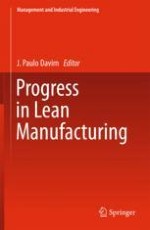2018 | OriginalPaper | Buchkapitel
Association Between Lean Manufacturing Teaching Methods and Students’ Learning Preferences
verfasst von : Guilherme Luz Tortorella, Rogério Miorando, Aurora Patricia Piñeres Castillo
Erschienen in: Progress in Lean Manufacturing
Aktivieren Sie unsere intelligente Suche, um passende Fachinhalte oder Patente zu finden.
Wählen Sie Textabschnitte aus um mit Künstlicher Intelligenz passenden Patente zu finden. powered by
Markieren Sie Textabschnitte, um KI-gestützt weitere passende Inhalte zu finden. powered by
